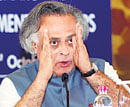
He noted that India was not having a major standoff with the United States but the real differences existed between the China and the developed world as well as that between European Union and the United States.
''India is not in the firing line,'' Ramesh told journalists here yesterday.
However, in the past few days US chief negotiator Todd Stern has told journalists here that that it would not suffice for developing countries to just post their domestic action taken to combat climate change for information and that powerful economies would need to demonstrate a greater commitment.
"There is no way to solve this problem by giving the major developing economies a pass," he said.
Stern noted that developing countries including Brazil, India, South Korea and China had made "significant" proposals but these would have to be "wrapped up" in an international agreement and not captured in "press release domestically".
Despite these glaring divergences, Ramesh told journalists that India and the US were not having problems here but the Americans had deeper contentions with China since it was the largest producer of greenhouse gases.
Instead, Ramesh stated that India as well as other emerging developing nations had divergent views with the Small Island States but India was pushing hard to play a "facilitative" role and bring all parts of the G77 together including the African group and AOSIS.
The admitted that India and other emerging economies' stand was different from the 43 countries in the AOSIS.
"We have to deal with them because they have a different point of view. I have been at pains to stress we do not want confrontation we want compromise and consensus," he said.
Ramesh noted that India and China were in "very close coordination" with several meetings between himself and Chinese Minister Xie Zhenhua in the past two days.
"We meet very frequently. We are coordinating our position. India's constructive role has come in for considerable mention and place. We're not being confrontation. We are trying to get all parties together," Ramesh said indicating he met his counterparts from Brazil and South Africa.
Ramesh said based on his discussions so far it appeared that if Copenhagen failed to deliver "what NGOs are calling FAB (Fair, Ambitious and Binding)" it would not be because of "India or the developing countries but because of differences between the developed world".
"There are differences between the EU and America," he said, noting that the European and Japanese don’t want to take on legal commitments unless the Americans also commit more but the US has made it clear that they will not join into any instrument that evenly remotely resembles the Kyoto Protocol.
"The basics issue is credibility of the commitments that the developed world has not been able to fulfill and they cannot hold India and China as excuses for non fulfillment," he added, pointing out that the developed countries had not kept their commitments to peak by 2020.
